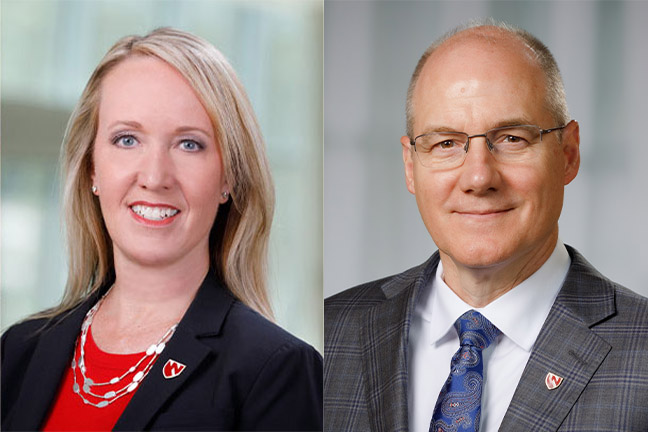Campus leaders Monday outlined a roadmap to best address information management growth opportunities across UNMC’s educational and research mission sets.
Discussions began last fall to address IT growth challenges and ways to improve UNMC’s information management organizational structures. Following an October listening session, two working groups – led by Anne Barnes, vice chancellor for business, finance and business development, and Ken Bayles, PhD, vice chancellor for research – met to continue discussions.
“This is the recognition of what we heard from the large working groups,” said UNMC Chancellor Jeffrey P. Gold, MD, who thanked all the participants and noted that, in many cases, the necessary resources are in place but simply have been “a best-kept secret.”
The recommendations, which span both education and research, include:
- Re-visioning the academic governance council from the IT Integration Plan (this group will sit alongside existing councils for clinical governance, technical and security, and data; all report to the existing information management governance cabinet that meets quarterly to set IT strategy and budget for the enterprise). The council will have its initial meeting in July.
- Creating a new UNMC IT leadership position to coordinate all UNMC information technology activities and resources. Barnes announced that Frank Bogatz, associate executive director of business and data operations for iEXCEL, will transition into this new role and serve as interim chief UNMC academic information system officer.
- Improving desktop support across all UNMC units (to include common IT training and minimum IT standards).
- Establishing minimum service standards – for issues including visibility, communication and turnaround time.
- Establishing a pool of new “common” laptops or hardware deployable across campus to accelerate onboarding.
- Providing sufficient wireless access points across campus.
- Segmenting the network to provide efficiencies in the non-PHI environment and reworking IT assessment/security review processes.
Research and education specific recommendations also emerged from the work groups.
See a PDF of Monday’s presentation, which includes the full list of recommendations.
Scott Raymond, Nebraska Medicine’s vice president-chief information and innovation officer, said work already has begun to establish stronger support for Mac users and streamline IT processes to advance projects more quickly. The network switches necessary to segment the campus Wifi network also have been ordered.
Some recommendations from these working groups have been implemented, with others to be prioritized and then addressed through a multi-year process, leaders said.
“This is very much the beginning of the conversation and an evolving process,” Dr. Bayles said.

This is a lot of “establish…” and change of process but how are you going to know if your key performance indicators, which has not been shared, or shown on the timeline, is working? When is this going to be reevaluated? Or is this the plan and saying “Look we did all this so it is fixed.” The committee is all leadership who are not involved in the actual day to day of the actual “end user” work. Unless you go back and test and listen to what the “end user” has to say and keep improving to make serious impactful changes, then what has been proposed does not matter.
Thanks for the comment, Robin. Leaders acknowledge that there is not a quick-fix solution to the broad and varied IT issues brought forward by the faculty senate and other campus groups. Much of the workgroup discussions are focused on issues that are a result of a siloed IT structure. As a result, the campus is addressing these issues through organizational change and re-establishment of an oversight committee that will remain in place to address campus (faculty, staff and student) concerns going forward.